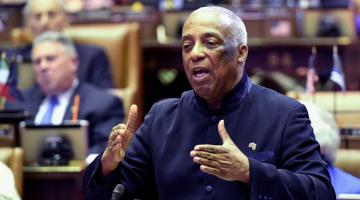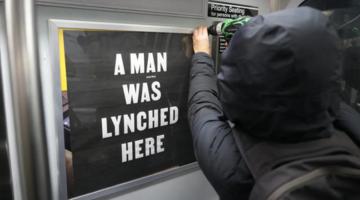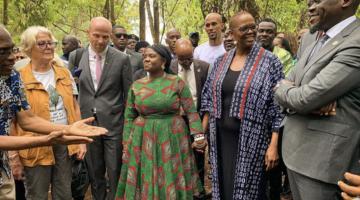The department’s discipline for illegal street detentions is lax at every level, according to an extraordinary review ordered by a federal judge.
Originally published in The New York Times.
At every level, the New York Police Department has failed to punish officers who have violated the rights of people stopped on the street, according to a new report — a failure that reaches all the way to the top of the force.
The report, the most comprehensive independent review of discipline since a landmark court decision in 2013, found that police commissioners during the past decade have routinely reduced discipline recommended for officers found to have wrongly stopped, questioned and frisked people, undermining efforts to curb unconstitutional abuses.
The report, by James Yates, a retired New York State judge, was ordered by Judge Analisa Torres of Manhattan federal court and made public on Monday.
Mr. Yates was assigned by the court to conduct a “granular, step-by-step analysis” of the department’s policies and discipline governing stop and frisk, a tactic of detaining people on the street that was being used disproportionately against Black and Latino New Yorkers.
The 503-page document that resulted paints a picture of an agency unwilling to impose discipline on an abusive practice that has prompted criticism that the department oppresses many New Yorkers.
The commissioners “demonstrated an inordinate willingness to excuse illegal stops, frisks and searches in the name of ‘good faith’ or ‘lack of malintention,’ relegating constitutional adherence to a lesser rung of discipline,” Mr. Yates writes.
The police did not immediately respond to a request for comment on the report.
The report arrives at a tumultuous time for the department. Edward A. Caban, the commissioner for a little more than a year, resigned on Sept. 12 after federal agents seized his phone as part of a criminal investigation. He has not been accused of wrongdoing, but the report underscores the perception that commissioners have created a culture of lax discipline in their response to cases across the board.
Since becoming commissioner in July 2023, Mr. Caban had stopped the disciplinary cases of 54 officers before they faced internal trials, according to an analysis by ProPublica that The New York Times published in June. On Sept. 9, in one of his final acts, Mr. Caban released watered-down guidelines for punishing officers for infractions like abuse of authority, discourtesy and misconduct, although not wrongful stop-and-frisk tactics.
In a letter explaining the revised guidelines for punishment, Mr. Caban said the changes would help the department continue “on the path of a fair and just discipline system.”
This month, Mylan L. Denerstein, a court-appointed monitor, found that specialized units revived by Mayor Eric Adams to seize guns were still stopping, frisking and searching people in violation of their civil rights.
In New York, discipline for police officers is usually recommended to the department by an independent city agency known as the Civilian Complaint Review Board, which considers allegations of abuse.
Former commissioners like Mr. Caban have defended their response to substantiated disciplinary cases, arguing that they punish officers more often than not.
Mr. Yates’s report, which Judges Torres filed on the court docket with an invitation for members of the public to submit comments, is notable for its focus on the department’s leadership. It emphasizes how commissioners have used their almost “unfettered reach” to downgrade punishments, even when officers have offended over and over again.
“Penalties for wrongdoing involving stops, questions, frisks or searches of persons (‘SQFS’), even when repeated, are rare,” Mr. Yates wrote after scrutinizing the outcomes of hundreds of cases.
The stop-and-frisk tactic defined policing on the streets of New York for decades, and was endemic in Black and Latino communities. Officers stopped people they believed were involved in crimes and then searched them for weapons that rarely materialized.
Mayor Michael R. Bloomberg, who served from 2002 to 2013, saw the practice as critical to fighting crime, and the police said it saved lives. Between 2004 and the middle of 2012, the police conducted more than 4.4 million stops. But whatever success the tactic had in fighting crime, it kindled widespread anger in the neighborhoods where it was most commonly used.
It also led to a class-action lawsuit called Floyd v. City of New York that resulted in a two-month nonjury trial and the 2013 court decision, in which Judge Shira A. Scheindlin determined that the practice had violated the constitutional rights of Black and Latino people.
Judge Scheindlin, who has since left the bench, ordered wide-ranging reforms, like the use of body-worn cameras and new training, and the appointment of a monitor.
Judge Torres, who has overseen the case since 2013, had not said in public filings why she wanted further study of the department’s disciplinary process. Mr. Yates’s report seems to suggest that she was not satisfied with its progress.
The report quotes a 2018 letter from Judge Torres asking for an in-depth, critical examination of department policies “with respect to police misconduct during stops” and seeking detailed recommendations for improvements — “in order to promote constitutional policing,” the judge added.
The assignment went to Mr. Yates, who was a state judge for almost 19 years and is a member of a team of lawyers, former police officials and others working under the monitor. A draft of the report was provided for comment to the parties in the Floyd case — who include the plaintiffs, the city and the Police Department — and Mr. Yates “revised the report as appropriate,” a court filing says.
Mr. Yates found that commissioners had routinely reduced or dismissed discipline for officers whose wrongdoing had been substantiated by the review board or a departmental tribunal.
At the precinct level, Mr. Yates writes, sergeants and higher-ranked officers tolerated inappropriate stops and failed to exercise proper supervision, which he says were significant hurdles “in achieving constitutional compliance.”
“Yet,” the report says, “discipline for such failures is close to nonexistent.”
Disciplinary guidelines instituted in June 2021 that covered how to handle misconduct in stop-and-frisk cases have been largely ignored, Mr. Yates says. Although the guidelines make the presumptive penalty three days of lost vacation time, “imposition of that level of discipline is a rarity,” the report says.
Mr. Yates’s report analyzes 224 substantiated accusations of stop-and-frisk misconduct from that month through March 2022. They involved 91 officers.
Of the 61 cases resolved by the time of the report’s writing, only 10 ended with the imposition of penalty days, the report says.
Mr. Yates notes that punishments for stop-and-frisk misconduct almost always come when other wrongdoing is found — such as excessive force, discourtesy or offensive language.
“Penalties for Fourth Amendment violations alone,” Mr. Yates writes, referring to illegal searches, “are the exception.”
The Yates report, which focuses largely on the years since Judge Scheindlin’s 2013 order, makes it clear that the department’s failure to punish officers has not been restricted to any single commissioner. The department has had six since the ruling, not including Thomas G. Donlon, whom Mayor Adams named this month as Mr. Caban’s interim successor.
The report includes many references to officers and supervisors whose names have been redacted.
Even when police commissioners agree with a finding of stop-and-frisk misconduct, they have often delegated discipline to precinct commanders.
“In those cases, imposition of penalty days at the precinct is even more rare,” Mr. Yates says.
Mr. Yates’s report notes that commissioners are required to explain their reasons when they decide to impose a lesser penalty than the oversight panel recommended.
But a review of more than 180 letters of explanation by commissioners between January 2020 and May 2023 in all sorts of misconduct cases showed that the documents were often perfunctory and barren of details, Mr. Yates’s report says. He writes that commissioners frequently excused misconduct on the grounds that an officer acted in “good faith” or with “good intent.”
Mr. Yates argues that excusing established misconduct, like an illegal stop and frisk, “merely because the police commissioner declares that the officer meant well or acted in good faith, is in clear defiance of the opinions in Floyd.”
“A citizenry plagued with Fourth Amendment violations,” Mr. Yates adds, “is not made whole when told that the officer did not mean to act illegally.”
Benjamin Weiser is a Times reporter covering the federal courts and U.S. attorney’s office in Manhattan, and the justice system more broadly. More about Benjamin Weiser
Maria Cramer is a Times reporter covering the New York Police Department and crime in the city and surrounding areas. More about Maria Cramer
















